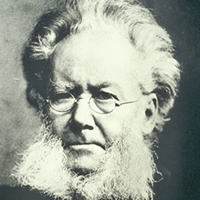A Doll's House as a Reformist Play
A Doll's House is a reformist play as it aims at reforming society by ending the inequalities among people and giving them freedom and education for living a life of dignity and independence. Feminism basically means dealing with the issues of female and questioning the assumptions of patriarchy about women.

Henrik Ibsen (1828-1906)
It explores the way women are treated by patriarchy and subverts the values of that system based as they are on stereotypes for describing the abilities, tendencies and nature of woman. Reformist implies having a project/ program for reforming society by removing the bad practices related to inequality, discrimination, domination and injustice. Reform is not only related to ending the discrimination practiced against woman, it deals with various issues concerning the people as a whole. Though, A Doll’s House deals with the position of women in patriarchal society, Nora should be seen as an individual first before we talk about her position as a wife and a mother.
A society is a group of different individuals. These people belong to different caste, class, gender, culture and groupings. Above everything else, everybody should be seen as a human being. No matter what role a person fulfills in a society he/she should be able to enjoy equal opportunities. Everybody should be free. In this kind of social environment, individuals can explore their potentials to the fullest possible extent. They can live a self reliant, free and a happy life. Inequality, discrimination and injustice in any form hinder individuals from realizing their potential. A Doll’s House is a reformist play because it questions the prejudices and inequalities that exist in society. Nora as an individual is treated as a child by her husband. She has to accept all family affair liked by her husband. She has always been ruled and controlled by her husband. She cannot decide things for herself. Torvald Helmer is the puppet master and she is his puppet. Her life is without dignity and freedom. She is playing things for her husband. She has no education and no job so she is dependent on her husband. She works for her husband and exists for him. Her life is confined within the four walls of the house and it is a kind of imprisonment for her.
When a society allows and individual to ill-treat another individual as inferior and subordinate, the society as a whole is tainted. Something must be done to change such society. As long as such ill practices are there in society we cannot call that society an ideal and a civilized one. By making Nora, leaving her husband and children, the dramatist is serving a great blow to a society where all individuals are not equal. At the end of the play when Nora is leaving home, she says that her duty towards herself is more important and primary than to her duty towards husband and children. First and foremost, she is an individual. Her role as a mother and wife is secondary. She leaves home to educate herself by gaining the firsthand experience of life and the world. She needs to empower herself as an individual so that she would no longer have to live the kind of life that she lived as wife and mother.
Hence, A Doll’s House aims at reforming society by advocating equality for all. When all individuals are equal and only they can live a life of freedom and dignity. Then only society as a whole will be a better place to live in.
A Doll's House Study Center
Signification of the Slamming of the Door in A Doll's House
Nora's Identity as a Person in A Doll's House
Parallelism and Contrast in A Doll's House
The Plot Construction in A Doll's House
A Doll's House Study Center
Introduction of A Doll's House
Detailed Summary of A Doll's House
Dramatic Irony in A Doll's House
Characterization of Mrs. Nora Helmer
A Doll's House as A Feminist Play
A Doll's House as a Modern Tragedy
 |
bachelorandmaster.com |